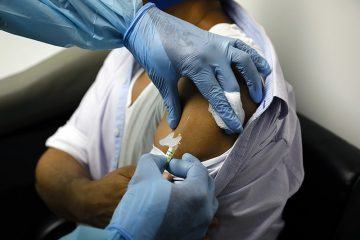Ewen Callaway in Nature:
 It works! Scientists have greeted with cautious optimism a press-release declaring positive interim results from a coronavirus vaccine trial — the first to report from the final, ‘phase III’ round of human testing. Drug company Pfizer’s announcement on 9 November offers the first compelling evidence that a vaccine can prevent COVID-19 — and bodes well for other COVID-19 vaccines in development. But the information released at this early stage does not answer key questions that will determine whether the Pfizer vaccine, and others like it, can prevent the most severe cases or quell the coronavirus pandemic. “We need to see the data in the end, but that still doesn’t dampen my enthusiasm. This is fantastic,” says Florian Krammer, a virologist at Icahn School of Medicine at Mount Sinai in New York City, who is also one of the trial’s more than 40,000 participants. “I hope I’m not in the placebo group.”
It works! Scientists have greeted with cautious optimism a press-release declaring positive interim results from a coronavirus vaccine trial — the first to report from the final, ‘phase III’ round of human testing. Drug company Pfizer’s announcement on 9 November offers the first compelling evidence that a vaccine can prevent COVID-19 — and bodes well for other COVID-19 vaccines in development. But the information released at this early stage does not answer key questions that will determine whether the Pfizer vaccine, and others like it, can prevent the most severe cases or quell the coronavirus pandemic. “We need to see the data in the end, but that still doesn’t dampen my enthusiasm. This is fantastic,” says Florian Krammer, a virologist at Icahn School of Medicine at Mount Sinai in New York City, who is also one of the trial’s more than 40,000 participants. “I hope I’m not in the placebo group.”
The vaccine, which is being co-developed by BioNtech in Mainz, Germany, consists of molecular instructions — in the form of messenger RNA (mRNA) — for human cells to make the coronavirus’ spike protein, the immune systems’ key target for coronaviruses. The two-dose vaccine showed promise in animal studies and early-stage clinical trials. But the only way to know if the vaccine works is to give it to large numbers of people, and then follow them over weeks or months to see if they become infected and show disease symptoms. These results are compared to those for a group of participants who are given a placebo. In the press release, Pfizer and BioNtech said that they had identified 94 cases of COVID-19 among 43,538 trial participants. The companies did not indicate how many of those cases were in the placebo group or among those that got the vaccine. But they said that the split of cases between the groups suggested that the vaccine was more than 90% effective at preventing disease, when measured at least one week after trial participants had received a second vaccine dose, three weeks after the first. The trial will continue until a total of 164 COVID-19 cases are detected, so initial estimates of the vaccines’ effectiveness could change.
More here.
